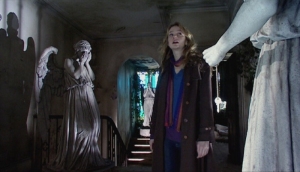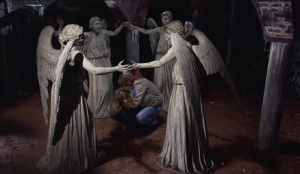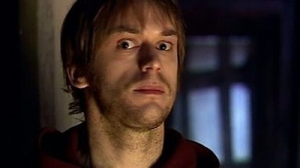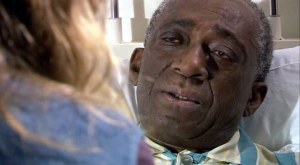Journey’s End is everything that is wrong with modern Doctor Who all rolled into one. I was torn over whether this is worse than Voyage of the Damned, but I think it has to pip it. It… is… terrible! It’s a melting pot of ideas thrown together and stirred until it’s nothing but fanboy pulp; it’s Russell T Davies writing from the point of view of a ten-year-old playing with his Doctor Who action figures and going “and then Jack turns up and then the Daleks fight them and then Torchwood and Sarah Jane help them and then Mickey comes back and then Martha and she teleports and then they explode and then there’s two Doctors and then-…”. There is no restraint shown, it’s just trash. It’s hard to believe this is the same writer coming from Turn Left and Midnight.

It’s telling that Davies wanted the Shadow Proclamation scene to be much bigger and include hordes of aliens from the past four years but they ran out of money so it had to be some Judoon and a woman with red contact lenses instead.
It’s simultaneously overblown and boring. It’s full of rambling exposition and ridiculous technobabble. It even makes fun of its own technobabble, but continues to use it to solve the plot anyway; meanwhile, interesting setups (like the Osterhagen key) go literally nowhere. A bluff amongst other bluffs with no consequence. Devices work and break and work again, people teleport in and out. Despite the two parts and extended length, the cast of characters is still too huge to get enough screen time. Even previously satisfying conclusions, such as Rose’s farewell in season 2, are undone, like prodding at a corpse to make it twitch. Rose now comes back then returns to the parallel world for really poor reasons, with a half-human double of the Doctor to spend her life with, just to thoroughly undermine one of the few good things about Doomsday.
As for the Daleks, I think they’ve given up any pretence that they’re an endangered species now. Time War? Void ships? Pah! Despite Rose eliminating “all Daleks” from existence with her godly powers, there’s somehow another army of them, grown from the cells of Davros himself, with enough power to move entire planets and destroy the Universe. No, not just the Universe, that’s not big enough anymore. We have to go bigger. All Universes! All parallel worlds, alternative timelines, past, present and future. All of reality and unreality and everything in between. The Daleks will destroy all of it. Don’t worry, though, the duplicate Doctor presses some buttons and all the Daleks are destroyed.

The 27 missing planets, pulled out of time and space, are used as a power source for the Daleks’ Reality Bomb, within the Medusa Cascade. Also something about bees.
I hated pretty much everything about this. Every little cliché that all the “big event” episodes have. All those TV news reports from around the world, celebrity cameos, disastrous events having no apparent consequences on everyday life, big fleets of CGI things swarming over the Earth while overbearingly bombastic music plays, the Doctor running about shouting plot things at people, and so on. There’s even a ratings-grabbing tease of a cliffhanger as it seems like the Doctor is going to regenerate (ooh, they kept that a secret!) but actually he comes back as David Tennant again because… yeah. The planet Earth being carried through space by the Tardis is the giant cherry on top of a very cheesy cake, and not in a good way.

The Doctor, the other Doctor, Captain Jack, Sarah Jane Smith, Martha, Rose and Rose’s mum, take the controls of the Tardis.
It’s not all bad, but it almost is. Admittedly, amongst all the running around, there’s some nice moments between the reunited characters. Wilf is good, as he always is. Doing a crossover with The Sarah Jane Adventures and Torchwood is an interesting idea, and I’ve been keeping up with both shows in parallel, so the events line up properly, but I can’t imagine the average viewer doing the same, given the target demographic for them. The return of Davros is a big moment and he is as bonkers as ever and looks disgusting, as he should. Oh, and German Daleks. It’s almost worth it for German Daleks. “Exterminieren!” Aaaaand… that’s it. That’s basically the extent of anything good in this finale.
Even Donna has to leave, and to make sure she can never come back, there has to be some memory-enabled killswitch in her head, because in modern Doctor Who, you can’t just part ways like ordinary people. Donna has, frankly, been fantastic, and she deserves a better end than this. She has been the moral compass for the Doctor on more than one occasion, and the best decision they made was in removing any possibility of romance right from the start so that she could have balanced motives and behave in a more human fashion. She will be missed.

Unable to retain the Time Lord knowledge, Donna’s memory is wiped. Because the Doctor can do that, apparently.
Season 4 has been really good, so it’s a shame that it had to end on such a duff note. This is the ultimate lesson in why “less is more”.











































